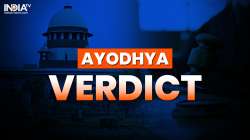Ayodhya verdict: Babri Masjid not constructed on vacant land, says CJI
"Titles can’t be decided on faith and belief but on the claims. Historical accounts indicate the belief of Hindus that Ayodhya was the birthplace of Lord Ram," the Supreme Court said.

Seventy years after the first court case was filed in the dispute post-Independence, the Supreme Court on Saturday read out the verdict in the Ram Janmbhoomi-Babri Masjid title suit. Reading out the judgement, the Chief Justice Ranjan Gogoi said that Babri Masjid not constructed on vacant land.
"There is adequate material in ASI report to conclude the following: Babri Masjid not constructed on vacant land. There was a structure underlying the disputed structure. The underlying structure was not an Islamic structure," the top court said.
The Supreme Court said that there is evidence that Ram Chabutra, Sita Rasoi was worshipped by the Hindus before the British came.
"Evidence in the records shows that Hindus were in the possession of outer court of the disputed land."
Chief Justice Ranjan Gogoi said Hindus consider Ayodhya as birthplace of Lord Ram,they have religious sentiments,Muslims call it Babri mosque. Faith of Hindus that Lord Ram was born here is undisputed.
"Hindus have faith and belief that Lord Ram was born under the dome. Faith is a matter of individual belief," the CJI said.
He said that the titles can’t be decided on faith and belief but on the claims. "Historical accounts indicate the belief of Hindus that Ayodhya was the birthplace of Lord Ram," the top court added.
The Supreme Court also dismissed the Special Leave Petition(SLP) filed by Shia Waqf Board challenging the order of 1946 Faizabad Court.
The Ayodha case is being heard by a Constitution Bench of Chief Justice of India Ranjan Gogoi and Justices SA Bobde, DY Chandrachud, Ashok Bhushan and Abdul Nazeer.
The bench on October 16 had reserved the judgment after marathon hearing of 40 days. The apex court had on August 6 commenced day-to-day proceedings in the case as the mediation proceedings initiated to find the amicable resolution had failed.